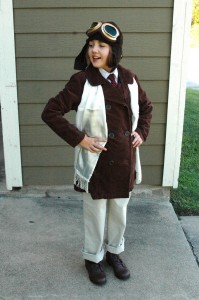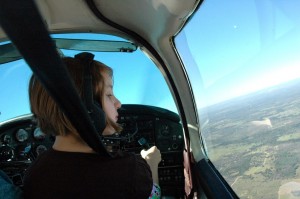Flygirl
The other day, Schuyler and I were at our local public library (because we’re solid citizens, or cheap, take your pick), and as we looked at the movies, she grabbed something excitedly and threw it on our stack without hesitation. I looked and saw that it was a biopic about Amelia Earhart from about five years ago. I’d almost forgotten about Schuyler’s long-ago obsession with Amelia Earhart, but of course she hadn’t. Schuyler holds on to things. She’s the wrong kid to do embarrassing things in front of.
 2009 was the Year of Amelia Earhart. Long before we even knew there was a movie coming out, Schuyler was given a list of famous Americans about which she could deliver a report, and she chose Earhart. Schuyler has always been fascinated with airplanes, so it was a natural fit. She worked hard on her report and delivered it on her speech device, including text and graphics displayed on a large screen for the class. When it was time to choose a Halloween costume, she asked to be Earhart, and we came up with what I’ll humbly suggest was her best ever. I felt bad for Schuyler because I was participating on an author panel at the Texas Book Festival, and in 2009, the festival fell on Halloween. Schuyler wore her costume to the festival but was denied trick or treating.
2009 was the Year of Amelia Earhart. Long before we even knew there was a movie coming out, Schuyler was given a list of famous Americans about which she could deliver a report, and she chose Earhart. Schuyler has always been fascinated with airplanes, so it was a natural fit. She worked hard on her report and delivered it on her speech device, including text and graphics displayed on a large screen for the class. When it was time to choose a Halloween costume, she asked to be Earhart, and we came up with what I’ll humbly suggest was her best ever. I felt bad for Schuyler because I was participating on an author panel at the Texas Book Festival, and in 2009, the festival fell on Halloween. Schuyler wore her costume to the festival but was denied trick or treating.
A friend in Austin who was a licensed pilot saved Halloween for Schuyler. The day after the festival, we met him at the local airfield. He first took us on board a very fancy private jet so Schuyler could sit in the cockpit and see what it felt like to be a professional pilot, and so her parents could sit in the back and see how the truly fancy-pantsed travel. But that wasn’t the good part.
That came next, when my friend took us up in his own private plane and gave Schuyler a flying lesson. And it wasn’t just a “put your hands on the wheel and pretend to fly” thing, either. He showed her the basics of flight control, explained how everything worked and then turned control of the plane over to her for the better part of an hour. She took initiative and tried some slightly queasy-making moves, and it was only in the final stages of landing that my friend took the controls back. (I was concerned during the approach as she slowly brought the plane down, I’ll confess.) A lot of people have given Schuyler gifts over the years, but I can’t think of one that has stayed with her more than her flight with my friend. If I believed in Heaven, I’d say my friend would have a sweet gig teaching angels how to fly when he gets there.
Ever since that day, if you ask Schuyler what she wants to be when she grows up, she won’t tell you she’s going to be a pilot. She’ll inform you that she already is one.
—–
Ambitions for kids with disabilities are tricky, in ways that are similar to those of typical kids but, as usual, more bitingly so. We all understand that as parents, we’re expected to embrace the narrative that tells our children that they can be whatever they want when then grow up. Within reason, of course; there aren’t a lot of pirates working outside of the Somali coast, after all, and being a princess isn’t nearly as much fun as it once might have been. Ninjas are probably out as well.
For parents of kids like ours, however, it’s a little trickier. Or so it seems when our kids are younger. When Schuyler was five and said she wanted to be a singer, I don’t remember what we said in response, but I don’t think it was “Nope, too bad, probably not going to happen.” I don’t think we ever told her any of her goals were unreasonable because of her disability, but at the same time, I confess that we probably did a bit of subtle steering. Singers are fine, I guess. But look how good your art is. There are a lot of ways you could be an artist one day. Or imagine being a teacher and helping other people like yourself? You have lots of choices…
I don’t think there’s anything wrong with letting your kid dream past their disability. If it involves a small lie, I think it’s not much different from the Santa story (SPOILER…) or the “anyone can be president” fib. (Watch Fox News for a few minutes, until your eyes begin to bleed, to see how the exception probably illustrates the rule.) Our kids are learning a great deal during their early years. That learning process involves more than finding alternate paths through the world. Kids like Schuyler are figuring out who they are, and how their disability can shape them even as they reject the idea that it should define who they are.
I don’t believe we need to instill our kids with a pragmatic awareness of how their disability can affect their dreams. I think that discovery is theirs to reason out. Schuyler is fourteen now, and she understands that being a singer isn’t realistic. I don’t know this because she’s said it out loud. But like so many things from her childhood, she’s quietly let go of it. If she was ever unhappy about this realization, she kept it to herself. It’s not such an unusual thing, the gentle release of a childhood dream. That’s what childhood is about, discovering what those dreams really are.
For special needs kids, having those dreams dismantled by the reality of disability has got to sting. But just as they learn what their obstacles are, kids like Schuyler are also finding their strengths. As they discover who they are, they learn what they can do. I suspect they know long before they share those dreams with us.
Schuyler doesn’t talk about singing anymore. But she mentions teaching, and she talks about helping people in a way that suggests she’ll be a better advocate than I can ever be.
And she still talks a great deal about flying. It’s not just a dream. She’s done it before. She has no doubt that she will do so again.
—–
After her flight, Schuyler excitedly told everyone on the ground that she was a pilot and was going to fly airplanes when she grew up. Her enthusiasm was infectious, even as it sent up all those little mental flags. Do we tell her now that it probably won’t work out? No, of course we don’t. She believes, and that’s enough, and maybe she’s right.
My pilot friend must have heard those little flags flapping. After he explained to us that Schuyler was an excellent student who listened closely and followed instructions better than many of his adult, typical students, he pointed out that to be a pilot, she would be required to communicate verbally with the control tower. I nodded, expecting that caveat to be the end of it.
“But I don’t believe that’s the case with a license to fly gliders,” he continued. “I can’t see any reason she couldn’t do that.”
There are always possibilities, we’re told. Schuyler knows this. She understands her monster more clearly now than ever, more even than we do. But it can’t clip her wings.
Note: To support the site we make money on some products, product categories and services that we talk about on this website through affiliate relationships with the merchants in question. We get a small commission on sales of those products.That in no way affects our opinions of those products and services.



To be a commercial pilot, yes, you need to be able to communicate with the pilot. However, as I learned from Henry Kisor’s book “Flight of the Gin Fizz,” private pilots flying in much of the airspace do not need to be able to talk with the tower (and in fact, there are many deaf pilots, Kisor among them, who can’t hear what a tower says to them). Kisor writes about his solo flight across the United States in the mid-1990s, as well as telling the story of an early 20th century cross-country flight to which his own trip pays homage. The book is a good read, and is available as an ebook with an epilogue to update the whereabouts of the many people who made appearances if your library doesn’t have access to a print copy.
Rob –
I continue to hate you, yet I continue to love you. Get out of my head, and stop reading my thoughts! How can you be such a good writer and hit me where I live so [expletive deleted] consistently?
Schuyler is braver than me when it comes to piloting. When I was 10, I won a one-hour flight in a small plane (with two friends!). The pilot tried to get me to pretend to fly the plane while it was obviously on autopilot, but I just couldn’t do it. It didn’t help that my friends were getting a bit scared in the back seat when they heard that (it later turned out this had been their Very First Flight Ever and no one had told me or the pilot!)
Also, on the subject of singing, there’s a Japanese softare called Vocaloid. It allows you to program a singing voice and a melody to make songs. It has been used to create synthetic J-pop singers, the most famous being Hatsune Miku. I’ve never used it, so I couldn’t tell you how easy to find or use it would be, but it could be interesting?
There is no FAA requirement to pass a physical to obtain a glider pilot license in the U.S. What the FAA says is:
“If you are going to pilot a balloon or glider, you don’t need a medical certificate. All you need to do is write a statement certifying that you have no medical defect that would make you unable to pilot a balloon or glider.”
If Schuyler can obtain a driver’s license she can also fly powered ‘Light Sport’ airplanes, which are small 2 seat airplanes that weigh less than 1300 pounds.
And of course she can fly with me anytime she’s in Austin.